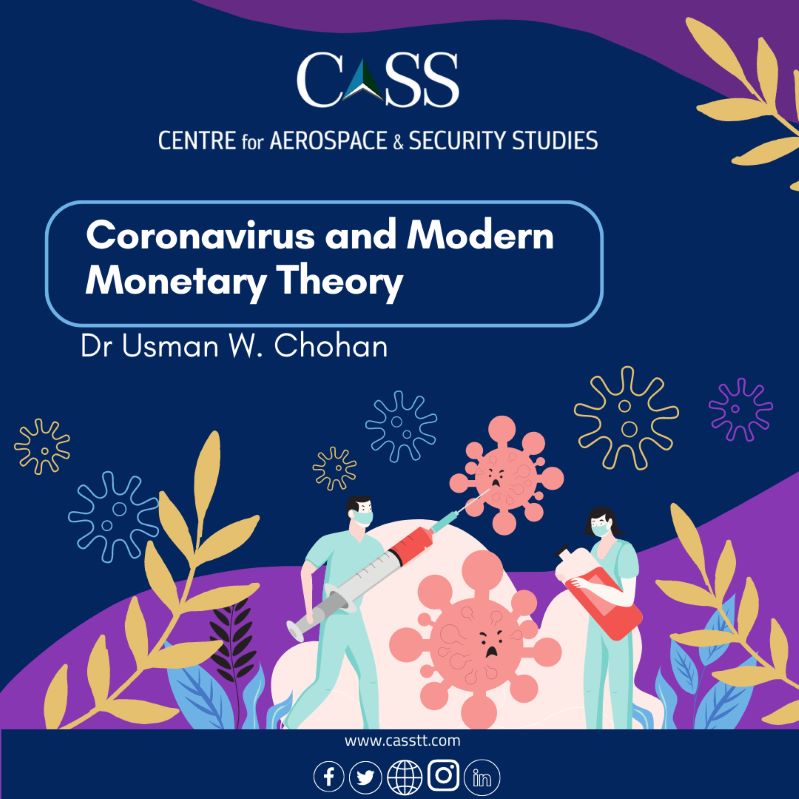The onset of a widespread pandemic has also opened the doors to new conversations about the economics. In particular, the response of governments to COVID-19, particularly in developed countries, echoes the precepts of an esoteric but fascinating macroeconomic approach known as Modern Monetary Theory (MMT).
MMT has evolved over the past two decades to explain certain perplexities regarding the role of currencies and monetary authority in powerful sovereign countries, such as the US, Japan, China, the UK, and the Eurozone.
The popular aphorism of its adherents is that, “to understand MMT, understand why the banker in Monopoly [board game] can never run out of money.” It argues, from a straightforward macroeconomic framework, that powerful sovereign countries (US, UK, Japan), can print as much money as they want to issue national debt in their own currencies, since they hold the monopoly to issue currency.
These governments are not “users” of currency in anything but accounting since – they are in fact the “producers” or “issuers” of a monopoly good that is conjured out of thin air. They literally will their currencies into being. In the US, this is true and evident, since Congress authorizes spending and the Treasury calls upon the Federal Reserve to provide funding, which the latter does at a stroke of a keyboard.
It is also why countries such as Japan have astronomical debts relative to GDP (nearly 250%), but no one bats an eyelid because Tokyo has issued that national debt in the Yen, on which it has a monopoly. Indeed, it also explains why the US can amass trillions of dollars in debt on waging war against small countries for decades on end. This then exposes the question why they do not spend on healthcare and infrastructure (constructive activities), but can muster a pool of imagined wealth for destructive purposes.
The limitation to infinite money printing is the point at which it produces excessive inflation. But no matter how much the US, UK, EU, or Japan print in money today, they simply cannot spur inflation. In fact, they face a long-term deflationary trajectory, which mirrors the realities of their society: aging and slowing societies.
MMT therefore challenges the greying orthodoxy of economics, whose high priests such as the monetarists believed that purely printing money would always generate inflation.
This is true for developing countries such as Venezuela, Pakistan, or Zimbabwe, which need to borrow in foreign reserve currencies. But it has not held true for the rich modern empires.
The US has just promised up to $4 trillion in liquidity to boost inflation during the coronavirus crisis, but inflation faces both structural barriers, as well as the realities of people held captive by necessary public health lockdowns.
This is where the old orthodoxy is soundly refuted: inflation actually occurs via the volume and velocity of actual economic activity relative to available economic resources. During the coronavirus lockdown, it is economic activity that is held back relative to available economic resources, and so governments need not worry about excessive inflation: rather they have to combat the risk of stagnation and deflation.
Hence, wealthy governments are promising astronomical amounts which their right-wing politicians were hesitant to do before largely due to orthodox advisers, vested private lobbying interests, and a recalcitrance to justify vast projects using traditional frameworks.
Coronavirus is leading to new conversations not just about spending during the crisis, but also for stimulus that must occur to restart the economy once the risks of COVID-19 contagion begin to flatten.
But what does this mean for the third world? Can they not follow its MMT’s precepts to rescue their struggling societies? Unfortunately, they cannot.
MMT is a theory of empire. This is not to say that its advocates are imperialists. Rather, they are observers who note a reality that the post-colonial thinker has long understood – imperialists can run the world on whims and fictions.
The question is ultimately, what are the merits of the whims. Should the US spend a trillion dollars invading a country of herdsmen, or should it build better hospitals, airports, and highways? MMT does not take a position on this; it merely states that the US can pursue either path indefinitely.
As it is a technical assessment of empire, it does not offer the substance for the wretched of the earth, the citizens of the third world, to liberate themselves from the shackles of an unfair economic system. They must still borrow in the world’s reserve currencies, and are therefore bound by the whims of their creditors.
What coronavirus now offers is a moment to view these international inequalities starkly and laid bare. But insofar as empires can withstand monetary shortcomings indefinitely, a new conversation about economics is being laid before a global audience, as trillions of dollars are being pumped without question into the modern monetary system.
In that sense, the COVID-19 pandemic presents an opportunity to raise questions about unorthodox monetary realities by examining unorthodox monetary theories, which will influence international economic systems in the decades to come.
– The writer is the Director for Economics and National Affairs at the Centre for Aerospace and Security Studies (CASS). This article was first published in The Nation newspaper. He can be reached at cass.thinkers@gmail.com.




